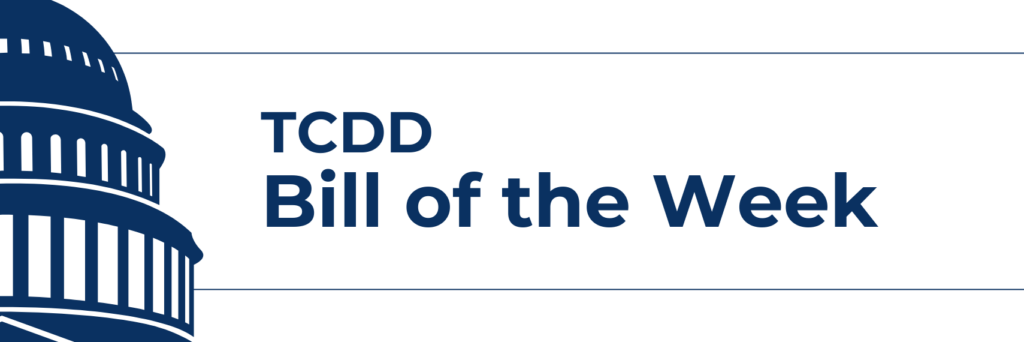
Table of Contents
For this weekly feature, the Texas Council for Developmental Disabilities (TCDD) profiles a noteworthy bill going through the legislative process. The bill may relate directly to TCDD’s Public Policy Priorities or another disability-related issue.
Bill of the Week: SB 57
Senate Bill (SB) 57, relating to plans by public schools to ensure the safety of people with disabilities during a mandatory school drill or a disaster or emergency situation. SB 57 was authored by Sen. Judith Zaffirini, from Laredo, Senate District 21.
Share This Bill
We’ve created a Bill of the Week one-pager (PDF) for SB 57. This is a simplified explanation of the bill that you can share with your representative and personal network.
Background
In 2023, HB 3 required the Texas Education Agency (TEA) to create guidelines for school districts’ multi-hazard emergency operations plans to ensure the safety of students and district personnel with disabilities during a disaster or emergency situation. However, there is concern that these plans might not include accommodations matching the unique needs of a student’s disability. Students in wheelchairs may have different needs and requirements than students who are deaf or blind, but these distinctions may be unaccounted for in current plans. Some argue that the ideal time to identify a student’s specific accommodations is during the consideration of a student’s Individualized Education Program (IEP) or Section 504 plan.
What does the bill do?
SB 57 would amend existing law to require a student’s IEP or Section 504 plan to identify any disability that requires accommodation during a mandatory school drill or a disaster or emergency situation. The bill would also require that IEPs and Section 504 plans recommend specific accommodations for a student’s disability.
Under SB 57, a student’s committee or team would provide the information required by the bill to each administrator who has emergency planning responsibilities at the student’s school district and campus. The bill stipulates that a student’s committee or team may invite school administrators who have emergency planning responsibilities to help make recommendations.
The bill would require TEA to create guidelines for the accommodation recommendations that would ensure the safety of students and district staff members with disabilities during emergencies or disasters. SB 57 also adds administrators who work with students with disabilities to the list of people who would be consulted during the development of these guidelines.
If passed, SB 57 would take effect on Sept. 1, 2025, or immediately if approved by a two-thirds majority in each chamber. TEA would be required to establish its new guidelines no later than Dec. 1, 2025. The provision requiring school drill accommodations to be identified in IEPs and 504 plans would apply beginning in the 2026-27 school year.

“I filed Senate Bill 57 to ensure public schools develop clear, inclusive emergency plans that account for students with disabilities — because no student should be left unprotected in a crisis.”
Sen. Judith Zaffirini, SB 57 author
Where is the bill in the process?
On Feb. 3, 2025, SB 57 was referred to the Senate Committee on Education K-16. The bill is waiting to be scheduled for a public hearing.
Who supports the bill and why?
The following comments were given as testimony at a hearing on March 13, 2023, on a bill similar to SB 57:
- Coalition of Texans with Disabilities: Jolene Sanders, advocacy director for the Coalition of Texans with Disabilities, testified in support of the bill. She outlined the benefit of having an emergency safety plan incorporated into an IEP or Section 504 plan. Sanders said: “It is important to outline [the emergency safety plan] in the IEP, not just so that the parent is aware or not just so that each member of the ARD [Admission, Review, and Dismissal] Committee is aware, but as you know, students with disabilities also participate, … and so, [it’s important] for them to also be aware of what the plan is in an emergency and to feel supported by those other people around the table.”
- Law Enforcement: Scott Moore, then a deputy sheriff for the Trinity County Sheriff’s Department and a former trustee for Conroe ISD, testified in support of the bill. He served on the school safety and security committee for Centerville ISD and advised the administration of Apple Springs ISD as a sheriff’s liaison. Moore said that the success of first responders in emergency situations often relies on the ability of the people in a facility to respond to basic directions and commands. He said: “We need these plans in place so that the teachers and the [paraprofessionals] responsible for these students can know the unique individual needs of those students, can practice the emergency procedures specific to that student, and can assist the first responder community.”
The following groups registered their support for the bill but provided no testimony: The Arc of Texas, the City of Houston Mayor’s Office, Texas Association of Community Schools, Texas Association of School Boards, Texas Catholic Conference of Bishops, Texas Classroom Teachers Association, Texas Elementary Principals and Supervisors Association, Texas Federation of Teachers, Texas Parent to Parent, Texas State Teachers Association, and United Ways of Texas.
Who opposes the bill and why?
No testimony was provided in opposition to the bill at the 2023 hearing.
Additional Testimony
The following comments were provided on the bill at the 2023 hearing:
- TCDD: Sabrina Gonzalez Saucedo, then a public policy analyst for TCDD, submitted written remarks on the bill. She wrote: “Effective and individualized emergency plans are an imperative part of disaster preparedness. To better ensure the safety of students with disabilities in Texas schools, it is vital for disaster planning to consider the needs of students, including those who have physical disabilities, have sensory disabilities, may lack understanding of a situation, or are unable to act quickly.” Gonzalez Saucedo recommended that the planning should address accommodations a student will need in an emergency drill in addition to an emergency or disaster situation. She wrote that “schools are required to carry out six different types of emergency drills a year, which include: a fire evacuation drill, a severe weather drill, a general evacuation drill, a lockdown drill, a secure drill, and a shelter in place for hazardous materials drill. Each of these emergency scenarios requires a specific response to ensure the safety of students. Therefore, the IEP team should coordinate a plan appropriate for each scenario given the needs of each student with a disability.” (Note: A provision related to drills was added to the 2023 bill in a committee substitute and can be found in SB 57.)
How much will the bill cost?
In 2023, the Legislative Budget Board found a bill similar to SB 57 would not impact the state budget in a significant way.
Is there a House companion to the bill?
There is no House companion to SB 57.
Related Bills
SB 752 by Sen. José Menéndez seeks to better ensure the safety of students with disabilities during emergency situations at postsecondary institutions. The bill has also been referred to the Senate Education K-16 Committee and awaits scheduling for a public hearing.
Stay Informed
For the latest information on the status of SB 57, follow the bill at the Texas Legislature Online. To receive future legislative updates from TCDD, follow us on Facebook, X, Instagram, and LinkedIn.
